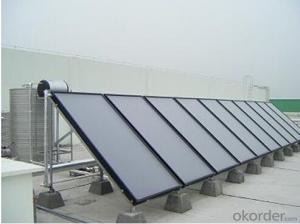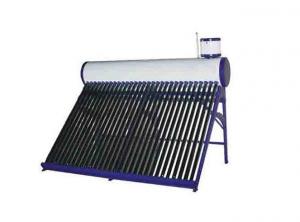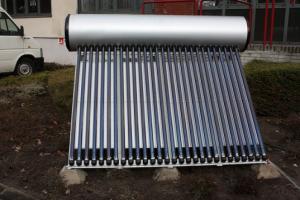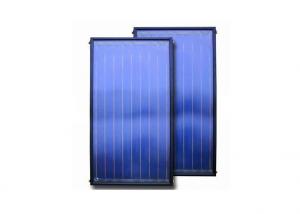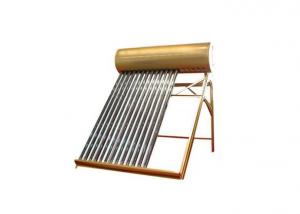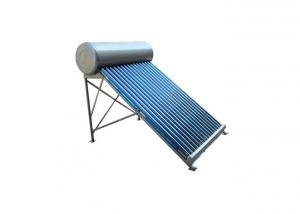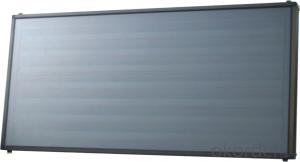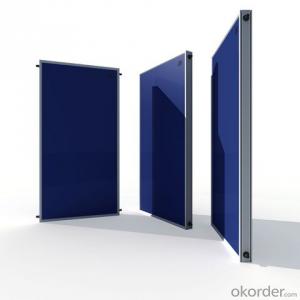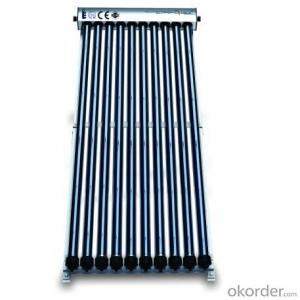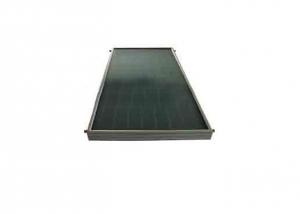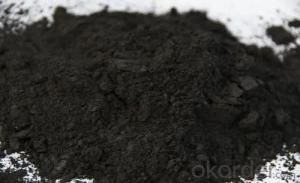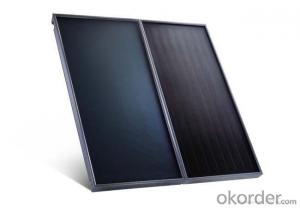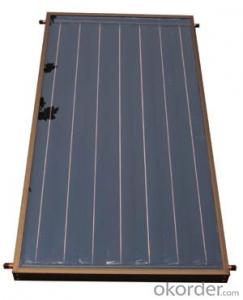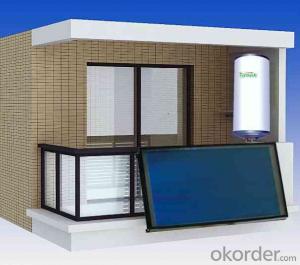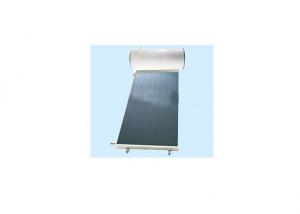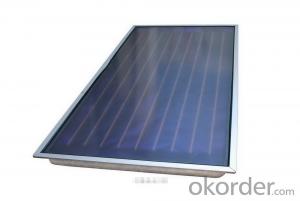Flat Plate for Solar Collector Model SDT3.0-A/C Series
- Loading Port:
- Shanghai
- Payment Terms:
- TT OR LC
- Min Order Qty:
- 50 pc
- Supply Capability:
- 300 pc/month
OKorder Service Pledge
OKorder Financial Service
You Might Also Like
1. Structure of Flat Plate for Solar Collector Model SDT3.0-A/C Series
This flat plate comprises strong low Iron tempered textured glass and absorber plate of different thickness and frame style for option, and risers and headers comform to international standard; for the back plate,it is constructed with galvanized steel and the frame is extruded with anodized aluminum alloy. This product is smart in appearance and get good quality.
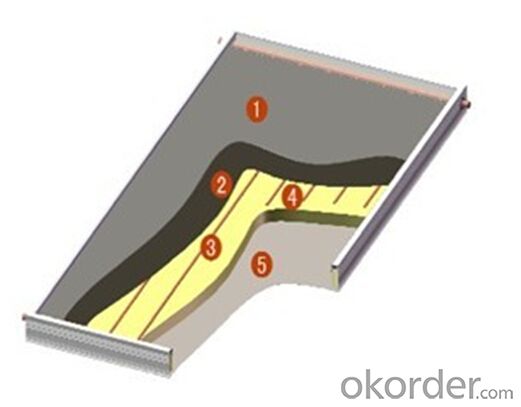
1.glazing, 2. absorber plate, 3. risers, 4. insulation, 5. casing
2. Main Features of Flat Plate for Solar Collector Model SDT3.0-A/C Series
low iron tempered textured glass can maximize the solar radiation available and minimize energy emittance
risers designed for either water or propylene glycol
good corrosion resistance and light handling capbilities
3. Flat Plate for Solar Collector Model SDT3.0-A/C Series Images
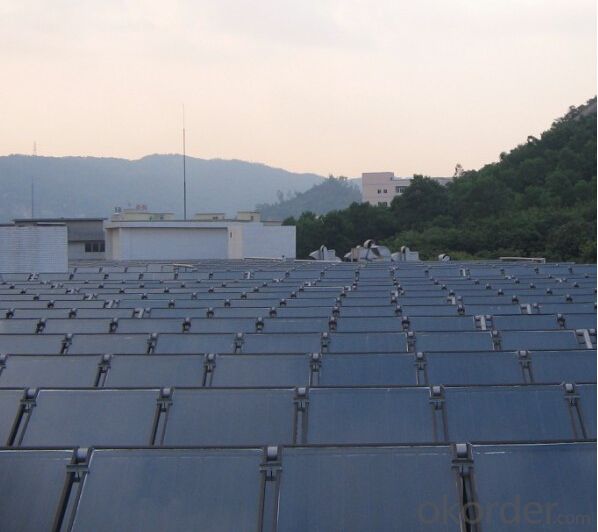
4. Flat Plate for Solar Collector Model SDT3.0-A/C Series Specifications
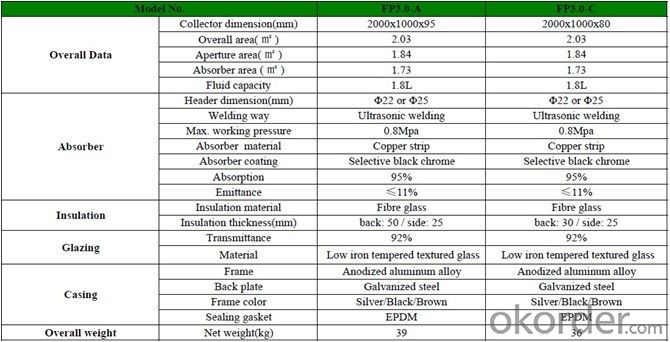
5. FAQ
Q1.: What is the respective diameter of the risers and heads?
Re: For the risers the diameter is 22mm &25mm and for the heads 10mm.
Q2.: What is the insulation of this product?
Re: Fiber glass is used to insulate the base of the collector to minimize heat loss. It has 30mm to 50mm thickness for option and has a conductivity <0.048W/(m.K).
- Q:Are solar collectors suitable for military applications?
- Yes, solar collectors are suitable for military applications. They provide a reliable and renewable source of energy, reducing the dependency on traditional fuel sources and enhancing energy security in remote or deployed military operations. Solar collectors can power various equipment, including communication systems, surveillance tools, lighting, and charging stations, making them a sustainable and cost-effective solution for the military. Additionally, their portability and scalability make them adaptable to different operational environments, further supporting their suitability for military applications.
- Q:Can solar collectors be used for generating electricity on college campuses?
- Yes, solar collectors can certainly be used for generating electricity on college campuses. Solar collectors, also known as solar panels, are designed to convert sunlight into electricity through the photovoltaic effect. College campuses are typically large and have ample rooftop space, making them ideal for installing solar panels. By harnessing the power of the sun, college campuses can significantly reduce their dependence on fossil fuels and lower their carbon footprint. Additionally, solar energy is a renewable source of energy, meaning it is sustainable and does not deplete natural resources. Installing solar collectors on college campuses can provide clean and reliable electricity, contributing to a more sustainable and environmentally friendly campus. Furthermore, colleges can also explore the option of integrating solar collectors into their curriculum, allowing students to learn about renewable energy technologies and gain hands-on experience in the field.
- Q:Are solar collectors easy to install?
- Yes, solar collectors are relatively easy to install. They require basic tools and can be installed on rooftops or in open spaces. However, professional installation is recommended to ensure optimal positioning and performance.
- Q:Are solar collectors suitable for heating livestock barns?
- Solar collectors are a suitable option for heating livestock barns. These collectors, such as solar water heaters or solar air heaters, offer an eco-friendly and cost-effective solution for warming up barns. By harnessing the sun's energy, they generate heat that can be utilized to maintain a cozy temperature inside the barns during colder seasons. This not only ensures the well-being and productivity of the livestock by providing a comfortable environment but also aids in creating a healthier atmosphere. Furthermore, solar collectors require minimal maintenance and can be effortlessly integrated into existing barn structures. In summary, incorporating solar collectors for heating livestock barns helps to reduce energy expenses, decrease dependence on fossil fuels, and contribute towards a more sustainable agricultural system.
- Q:Can solar collectors be used in wineries?
- Yes, solar collectors can be used in wineries. Solar collectors, such as solar panels or solar thermal systems, can be used to harness the energy from the sun and convert it into electricity or heat. In wineries, solar collectors can be used for various purposes. One common use is to generate electricity to power the winery's operations. This can include powering lights, machinery, refrigeration systems, and other electrical equipment required in the winemaking process. By utilizing solar energy, wineries can reduce their reliance on fossil fuels and lower their carbon footprint. Solar collectors can also be used to provide heat for winemaking processes. Solar thermal systems, which use the sun's energy to heat fluids, can be used to warm water for cleaning equipment, sanitizing bottles, and even for heating the fermentation tanks during the winemaking process. This can help wineries reduce their energy costs and increase their sustainability. Furthermore, solar collectors can be integrated into winery building designs to provide natural lighting and reduce the need for artificial lighting during daylight hours. This can create a more pleasant working environment for winery staff while saving on energy consumption. The use of solar collectors in wineries not only promotes sustainability but also helps wineries save on energy costs in the long run. Additionally, it enhances the winery's image as an environmentally friendly and socially responsible business.
- Q:Are solar collectors suitable for heating restaurants?
- Yes, solar collectors are suitable for heating restaurants. They can provide a cost-effective and sustainable solution for heating needs, especially in regions with abundant sunlight. Solar collectors can efficiently capture solar energy to heat water or air, which can then be used for various heating applications in restaurants such as space heating, hot water supply, and even cooking. By utilizing solar energy, restaurants can reduce their reliance on traditional fossil fuel-based heating systems, lower energy costs, and contribute to environmental sustainability.
- Q:How do solar collectors compare to other sources of renewable energy?
- Solar collectors are a highly efficient and reliable source of renewable energy. Unlike other sources such as wind or hydroelectric power, solar collectors can be installed almost anywhere and are not dependent on specific geographical conditions. Additionally, solar collectors have a longer lifespan and require less maintenance, making them a cost-effective option for generating clean energy.
- Q:Can solar collectors be used for generating electricity in forests?
- Yes, solar collectors can be used for generating electricity in forests. However, the efficiency of solar collectors may be affected by the shading caused by trees and foliage. It is important to carefully consider the location and positioning of solar collectors to maximize sunlight exposure and optimize electricity generation in forested areas.
- Q:Can solar collectors be used for heating courthouses?
- Yes, solar collectors can be used for heating courthouses. Solar thermal systems can effectively capture and convert sunlight into heat energy, which can be used for space heating in buildings, including courthouses. This renewable energy source can significantly reduce the reliance on traditional heating systems and help in achieving sustainable and cost-effective heating solutions for courthouses.
- Q:How do solar collectors affect community engagement?
- Community engagement can be significantly enhanced by the presence of solar collectors. Primarily, the installation and use of solar collectors can function as a community-wide endeavor that brings people together. The planning, financing, and implementation of solar collector systems typically necessitate the collaboration and involvement of various stakeholders, including residents, local businesses, and community organizations. This active participation encourages a sense of community engagement, as individuals unite to promote renewable energy and sustainability. Moreover, solar collectors can act as a catalyst for educational initiatives and awareness campaigns within the community. The introduction of solar energy systems can ignite curiosity and interest among residents, leading to opportunities for learning and discussions regarding the advantages of renewable energy sources. This heightened awareness can motivate individuals to engage more actively in sustainable practices and advocate for local and regional renewable energy policies. Additionally, solar collectors bring economic benefits to the community, further enhancing community engagement. By harnessing sunlight, solar collectors can lower energy costs and generate potential revenue by selling excess energy back to the grid. These financial advantages can be utilized to fund community projects, support local businesses, or invest in other sustainable initiatives. The economic empowerment resulting from solar collectors can motivate community members to participate actively in decision-making processes and take ownership of their community's sustainable future. In conclusion, solar collectors possess the potential to positively impact community engagement by promoting collaboration, education, and awareness, as well as providing economic advantages. By embracing solar energy, communities can strengthen their bonds, empower their residents, and work together towards a more sustainable and resilient future.
1. Manufacturer Overview |
|
|---|---|
| Location | |
| Year Established | |
| Annual Output Value | |
| Main Markets | |
| Company Certifications | |
2. Manufacturer Certificates |
|
|---|---|
| a) Certification Name | |
| Range | |
| Reference | |
| Validity Period | |
3. Manufacturer Capability |
|
|---|---|
| a)Trade Capacity | |
| Nearest Port | |
| Export Percentage | |
| No.of Employees in Trade Department | |
| Language Spoken: | |
| b)Factory Information | |
| Factory Size: | |
| No. of Production Lines | |
| Contract Manufacturing | |
| Product Price Range | |
Send your message to us
Flat Plate for Solar Collector Model SDT3.0-A/C Series
- Loading Port:
- Shanghai
- Payment Terms:
- TT OR LC
- Min Order Qty:
- 50 pc
- Supply Capability:
- 300 pc/month
OKorder Service Pledge
OKorder Financial Service
Similar products
New products
Hot products
Hot Searches
Related keywords
